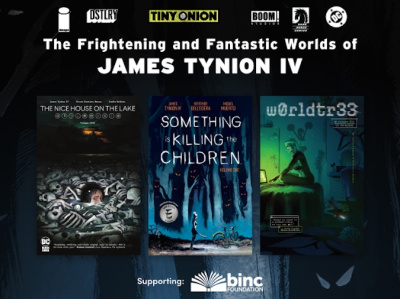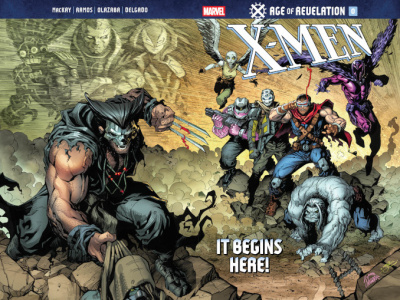Confessions of a Comic Book Guy is a weekly column by retailer Steve Bennett of Mary Alice Wilson's Dark Star Books in Yellow Springs, Ohio. This week, Bennett looks at the comic format and 'comics stigma.'
I certainly didn't mean to again mount my trusty hobby horse about how the comic book as we know has to change this week. But when Devil's Due made their announcement they'd acquired the rights to produce a comic book version of the Family Guy TV series, I read the description of the comics' format (48 pages, square-bound, a $6.95 price, combination of text and comics, etc.) with a certain amount of cynical smugness. Like the Dark Horse Emily the Strange series of 'mooks' (a bit of Japlish that means 'magazine/book,' and it's fun to say!), it seemed an obvious attempt to attract members of the bookstore tribe who still look down on volumes of Amazing Spider-Man while happily clutching copies of Garfield Dies of an Intestinal Blockage to their chests.
Then this week in an interview with Newsarama, Josh Blaylock of Devil's Due pretty much admitted all of the above and in language that's a whole lot less politic than mine. I quote:
'It was very important that we created something marketable. We couldn't sell this like the Simpsons comics, for example. It just wouldn't work. I don't think Americans are interested in reading something like that. I'm a Simpsons fan, but have no interest in reading the comics, funny as they might be, I just don't. But put the Ralph Wiggum Book of Wisdom in front of me, and I'm going to check it out.'
'The way they're formatted, they should appeal to the comic book racks, but also Urban Outfitters, Tower Records, Hot Topic, Borders and B&N. That's partially the reasons for the slightly higher price point. In the mass market, it's affordable, but high enough to appeal to those stores. If you're priced too low, stores don't want to carry you as much, because their shelf space is too valuable to them, and they need to see a good return on every inch of it.'
So far, it seems Josh and I are pretty much on the same page when it comes to changing the current comic book format if we want to reach out to a larger readership, but then I came to this quote:
'It's going to be one of those comics that can transcend the 'comic stigma' and anyone can read it for a good laugh.'
I really don't want to be accused of misinterpreting him because there's a couple of ways to parse that sentence. Its certainly possible Josh meant 'comic stigma' in the sense a comic book is frequently stigmatized by the direct market for actually being funny, but it seems more likely he meant his Family Guy volumes would be able to escape the disgrace of being considered just a comic book. If this is the way he meant it I have to admit this kind of open distain for the form coming from someone who wants me to carry his G.I. Joe and Hack/Slash comics seems kind of strange.
There's a strange sort of irony at work that while the American comic book industry seems inherently limited, it's still a strong enough model to attract imitators as other countries try to create their own indigenous versions of it, complete with American style super-heroes. Two weeks ago the Internet was all abuzz with articles about how Sir Richard Branson was bringing his Virgin brand into the world of comics.
And last week a lot of attention was being given in the press to stories about a Kuwaiti comics entrepreneur named Naif al-Mutawa (who recently bought Cracked magazine) who's founded Teshkeel Media. His first creation is The 99, a super-hero group each of whom exemplify one of the 99 qualities that Muslims believe God embodies.
He's not the first in the Arab world to try and create a local comic book business; there's AK Comics, an Egyptian venture started with a 'pop desire to show...Arabs can do anything Westerners can' (a statement somewhat mitigated by the fact that the company was unable to find anyone in the Arab world to actually create them, so AK had to outsource the art to Brazil and the scripts to California).
Of course Teshkeel has a couple of advantages over AK; they have former Marvel writer Fabian Nicieza working for them and the rights to translate and publish Arabic versions of Marvel Comics, which they'll release side by side with their own characters.







